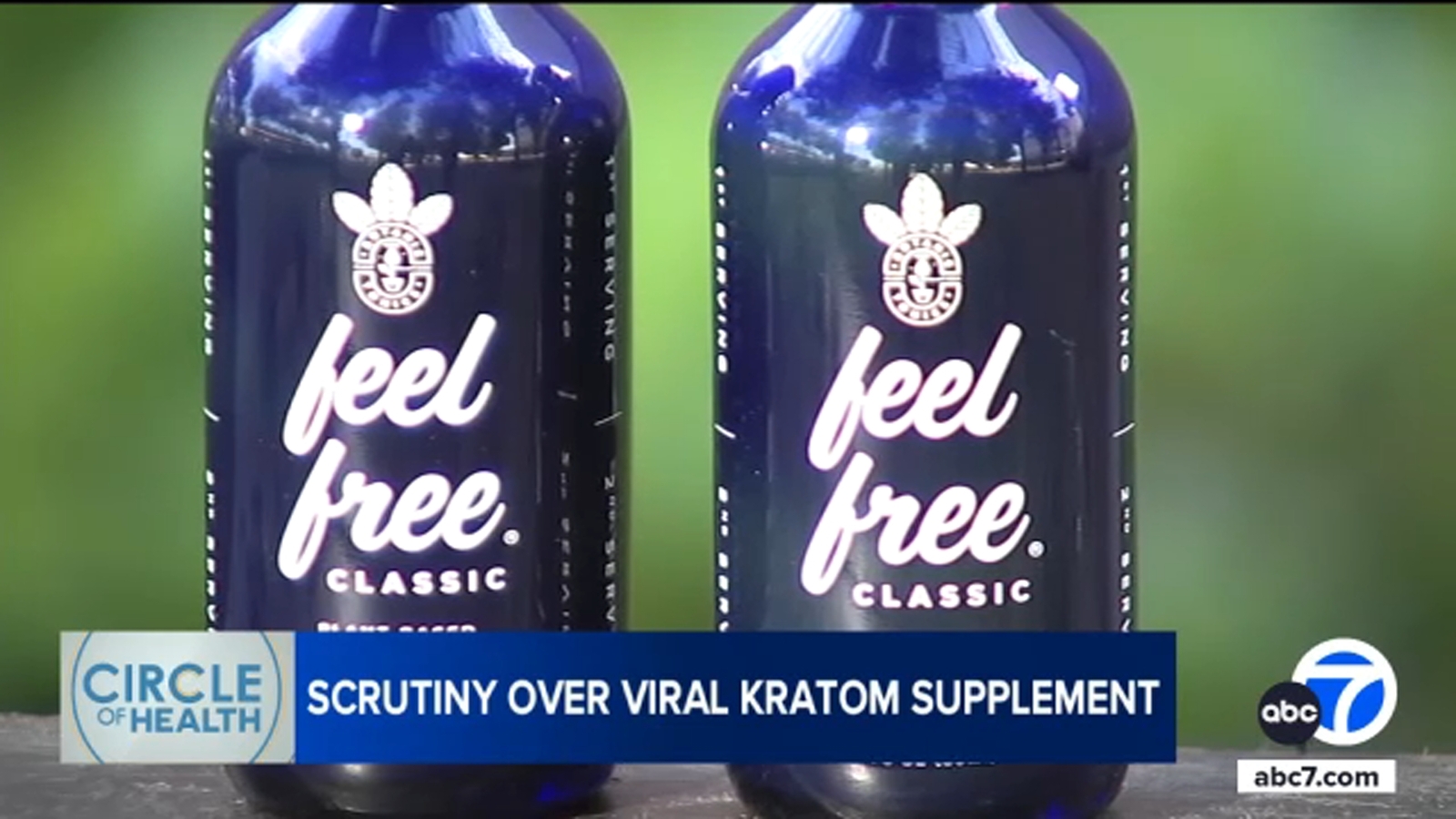LOS ANGELES (KABC) — The FDA is investigating the dangers of a synthetic compound in some popular kratom-containing supplements.
L.A. County health officials are linking three local deaths to the consumption of that synthetic compound where alcohol was also present.
Now, a company that claims to sell an all-natural form of kratom is getting a lot of scrutiny on social media. Does it carry risks of its own?
On Tiktok, Chris Oflyng described a product he’s been consuming.
“I’ve been addicted to these for a while,” he said in a post.
No matter how hard he’s tried, the 28-year-old said he can’t stop taking a kratom supplement called Feel Free.
“Falling into even taking one, two, three bottles at a time,” he said.
A serving size is half a bottle. The label warns no more than two servings a day. Oflyng says it’s habit-forming and he isn’t alone. On TikTok, a myriad of testimonials.
“Three years ago, I became severely addicted to the herbal tonic Feel Free which ultimately landed me in rehab,” said influencer McKenzie Wisdom in a post.
Besides being potentially addictive, doctors warn that kratom, a substance that comes from a tropical tree in Southeast Asia, could have serious health consequences.
Some of the most often cited reasons for taking it include treating chronic pain, depression and anxiety, but no uses are approved by the FDA.
“Kratom has never been regulated. It’s a mild opiate, but it is highly addictive, and it can cause people to do all the things opioids do,” said Dr. Terry Simpson, a culinary medicine specialist at Dignity Health St. John’s Regional Medical Center.
At issue is a psycho-active kratom component called 7-hydroxymitragynine or 7-OH.
In July, the FDA recommended it be placed under the Controlled Substances Act. But, the FDA also stated “..it is not focused on natural kratom leaf products.”
Botanic Tonics, the company that makes Feel Free, said their product only contains natural whole leaf kratom and limits 7-OH content to 1%.
Cardiologist Dr. Jennifer Miao says whether it’s natural or synthetic, they’re metabolized the same way in the body once ingested.
“The difference is not that much between synthetic hydroxymitragynine and natural leaf kratom when it’s broken down in the body. If they were different than the lab-made synthetic hydroxy, 7-hydroxy-metragynine would derive a different name,” she said.
Botanic Tonics disagrees and says when used as directed by healthy adults, Feel Free presents no significant or unreasonable risk.
They cite a 2024 FDA study where 40 participants were given increasing doses of kratom leaf powder. Researchers found botanical kratom was well tolerated at several doses with no serious adverse events. Miao said this was a limited, small study and urges caution.
“We just don’t know what it does long term, and we don’t have a good safety profile for this substance, ” Miao said. “It’s also important to keep in mind that the type of kratom that they use, that the FDA used for the purposes of their study, may not be the same type of source that other companies are using.”
Kratom is the second ingredient listed on the Feel free label. Kava is the first.
Simpson said this herb that comes from the pepper family is known to generate a feeling of euphoria and it’s another compound consumers should be wary of.
“It does not have the same addictive problems that Kratom has. But it does cause liver failure in higher doses, so think of kava like you would alcohol,” he said.
Last year, Botanic Tonics settled a class action lawsuit where consumers claimed it used misleading marketing.
As part of the settlement, the company changed its labeling stating “Feel Free is for those 21 and older,” and added “…like caffeine and alcohol, can become habit-forming and harmful to your health if consumed irresponsibly.”
The U.S. Drug Enforcement Administration has listed kratom as a “drug of concern.”
According to the FDA and published medical studies, serious side effects may include severe liver damage, fast heart rate or arrhythmias, high blood pressure, tremors and seizures. Reports of death have been linked to kratom products as well in combination with other substances.
On TikTok, Oflyng said, “The craving is so, so intense.”
Oflying said he wished he knew Feel Free could be addictive.
He described going through withdrawals every time he tries to quit. And although the label says it’s for adults, he’s seen how easy it is for kids to get access.
“I really want to talk about Feel Free, because this product is inconspicuous, it’s in gas stations all around the country,” he said.
On his social media, Oflyng said, “Just going back and forth fighting with myself. Am I going to get one? Am I not going to get one?”
He says he struggles to stop using it.
Copyright © 2025 KABC Television, LLC. All rights reserved.
